A Year To Address Colonialism Directly: Free Palestine


The death toll in Gaza and the Occupied West Bank on the 31st December 2023 stands at at least 21,822, according to Al Jazeera. As the world hurtles towards the doorstep of a new year, the spectre of colonisation continues to shape societies and communities across the globe.
Today’s international law regime was formed in the first half of the twentieth century not only to regulate relations between nations but also to aid self-determination movements around the world and oversee the end of colonialism. Israel’s ethnic cleansing in the Palestinian territory, along with the international community’s inability to respond, underlines the regime’s failure to contribute to the end of colonial activities, provoking scrutiny of its fundamental raison d’être.
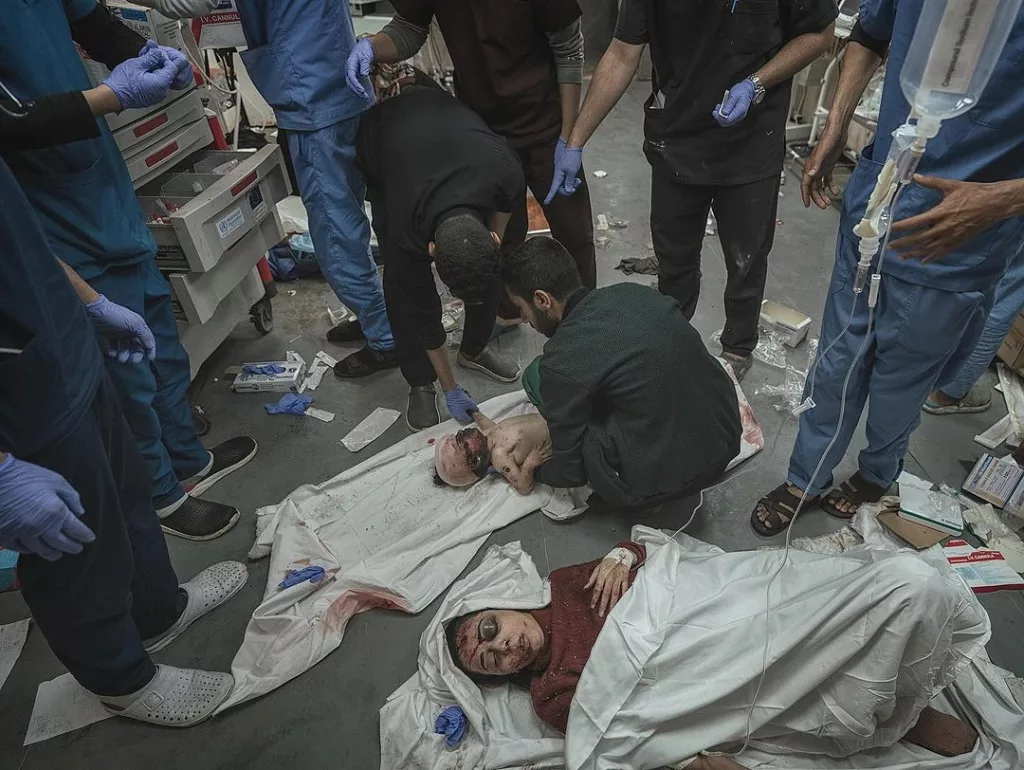

The Zionist Movement
Those seeking to comprehend the current complexities of the so-called Israeli-Palestinian “war” must first understand its historical and geopolitical structures. Understanding the nature of the Israeli state, society, and economy as a result of a larger settler-colonial movement marked by a hybrid form of nationalism combined with a sophisticated colonial model is necessary. This integration is at the heart of Israeli state ideology; it has methodically directed decades of policies of forceful dispossession of Palestinians to construct an ethnically exclusive Jewish state.
The Zionist movement originated in Eastern and Central Europe in the late half of the nineteenth century. Although political Zionism is a European movement that has been nurtured and sculpted by the continent’s sociopolitical growth, it has had far-reaching ramifications in other parts of the world. Indeed, as a place, people, and history, Palestine is a prime victim of Europe’s complicity in exporting its own issues.
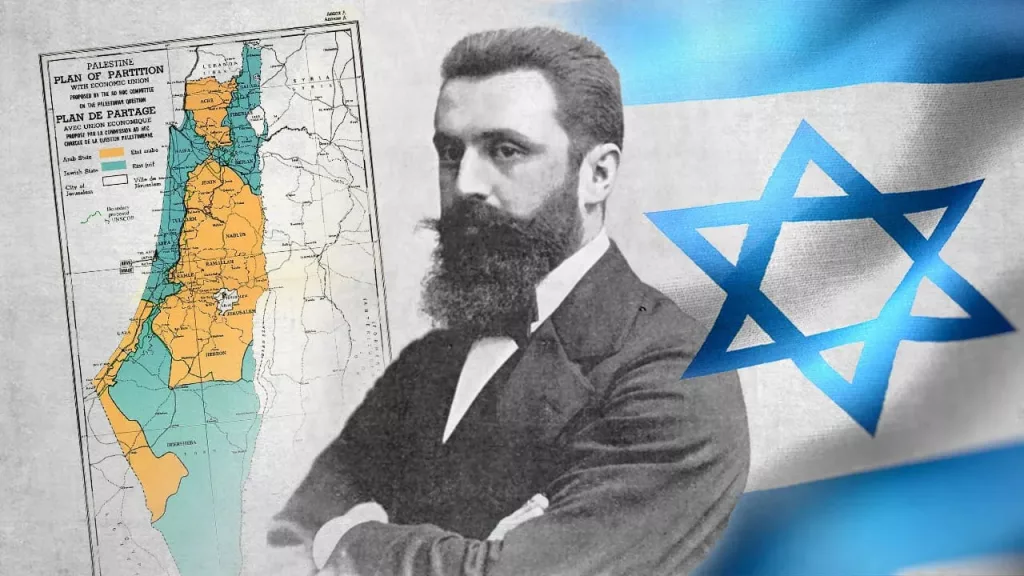

Zionist Colonialism and The Nakba
The Zionist colonisation of Palestine began during the final phase of the Ottoman rule and thrived throughout the British Mandate. The post-WWI division of the Arab Levant into zones of influence under British and French hegemony signalled the beginning of colonial aims. Palestine was annexed by the British, which provided a good opportunity for the Zionist movement’s diplomatic manoeuvring. The British government published the Balfour Declaration in 1917, pledging the British Empire’s support for “the establishment in Palestine of a national home for the Jewish people” (BBC).
Zionist military campaigns culminated in what is widely referred to as “the ethnic cleansing of Palestine”: a series of systematic and deliberate terror campaigns conducted in 1947 and 1948 to uproot and expel as many Palestinians as possible from most major urban and rural areas. This is referred to as the Nakba. Various pro- and anti-Zionist historians have documented this tragic event. According to Ilan Pappe, an Israeli historian:
On a cold Wednesday afternoon, 10 March 1948, a group of eleven men, veteran Zionist leaders together with young military Jewish officers, put the final touches to a plan for the ethnic cleansing of Palestine. That same evening, military orders were dispatched to the units on the ground to prepare for the systematic expulsion of the Palestinians from vast areas of the country.
The Ethnic Cleansing of Palestine
The Zionist Dream
Following the consolidation of the settler-colonial state, Israel began a new colonial enterprise to expand its borders and realise its ambition of a “Greater Israel” with maximum territory and minimum Arabs. To achieve this goal, Israel launched a lightning war against its Arab neighbours in 1967, resulting in a fast triumph that marked the beginning of a new chapter in its settler-colonial expansionism. While conquering the Sinai Peninsula and the Golan Heights, it extended its colonial order over the remaining areas of Palestine.
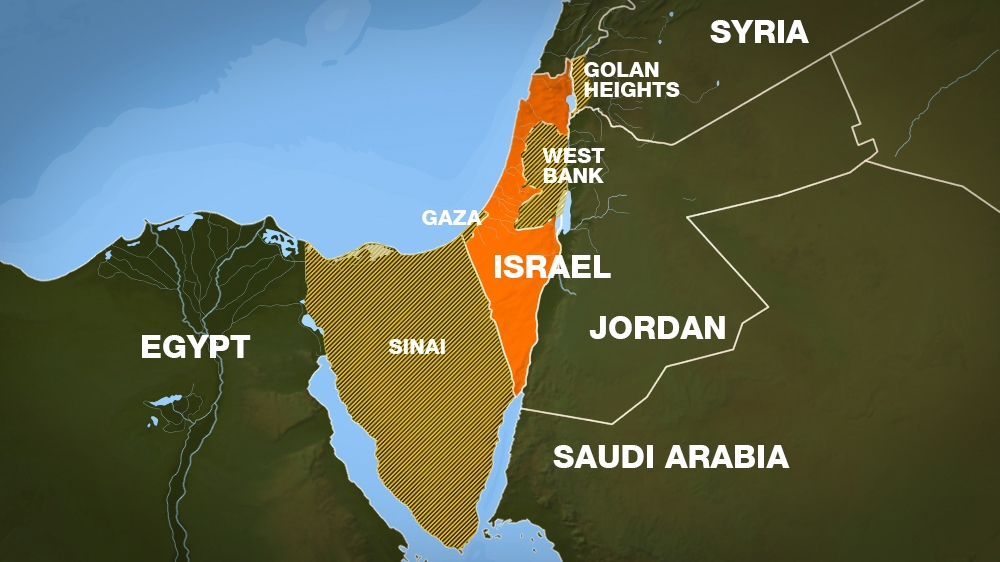

The occupation of the West Bank, East Jerusalem, and the Gaza Strip was seen as a completion of the Zionist project of greater Israel over historic Palestine, without which “the Zionist dream would remain incomplete” (Ilan Pappe, A History of Modern Palestine: One Land, Two Peoples). The Palestinians who survived the 1948 displacement and became second-class citizens of Israel, experiencing institutional discrimination and exclusion, developed various strategies for advocating for their national and civic rights.
The vast majority of Palestinians in the post-Nakba period lived in appalling conditions, scattered in refugee camps, and denied political rights and dignity. In addition, they were denied a unique political identity. Their activism was primarily channelled through Arab political parties and subservient to various Arab regimes. By the late 1950s, a few Palestinian resistance organisations, including the origins of Hamas, the Islamic Resistance Movement, had formed and begun armed conflict along Israel’s borders with Jordan and Lebanon. However, Israel has maintained strict control over Gaza’s airspace and territorial waters since 2007, restricting the flow of goods as well as people in and out of the territory.
Protests in Sheikh Jarrah
In May 2021, Palestinian families in Sheikh Jarrah, an occupied East Jerusalem neighbourhood, started to oppose Israel’s plan to expel them from their houses to make room for Jewish settlers. Many of the families are refugees who were forcibly displaced around the time of Israel’s formation as a state in 1948 and resided in Sheikh Jarrah. Since Israel’s occupation of East Jerusalem and the rest of the West Bank in 1967, Palestinians in Sheikh Jarrah have been repeatedly targeted by Israeli authorities, who employ discriminatory legislation to systematically deprive Palestinians of their land and houses to benefit Jewish Israelis.
Thousands of Palestinians across Israel and the Occupied Palestinian Territories protested in support of the families and against their shared experience of fragmentation, dispossession, and segregation in response to the demonstrations in Sheikh Jarrah. Israeli police responded with harsh and lethal force, injuring, arresting, and detaining thousands.
The events of May 2021 exemplified the injustice that Palestinians have endured daily for decades. Discrimination, dispossession, persecution of dissent, killings and injuries are all part of a system structured to benefit Jewish Israelis at the expense of Palestinians.
This is apartheid.
The Hamas Attack
On Saturday morning, October 7, Hamas launched a massive missile bombardment into southern Israel, with sirens heard as far away as Tel Aviv and Beersheba. In the initial attacks, the organisation claimed to have launched 5,000 rockets. According to the Israeli military, 2,500 rockets were fired. An hour later, fighters crossed into Israel via land, air, and sea in an unprecedented multipronged attack. The majority of the fighters entered through gaps in the security barriers that separate Gaza from Israel.
The surprise attack by Hamas occurred after Israeli settlers stormed the Al-Aqsa Mosque compound in recent days and after Israel killed a record number of Palestinians in recent months. In numerous parts of southern Israel, gun fighting continued between Israeli forces and Palestinian fighters. Israeli air assaults and rocket firing into southern Israel continued late into the night.
Following the Hamas attack, Israeli Prime Minister Benjamin Netanyahu vowed to turn Gaza into a “deserted island” and advised inhabitants to “leave now.” Both Israel and Egypt have maintained their borders mostly closed, contributing to the deterioration of an already precarious economic and humanitarian situation.
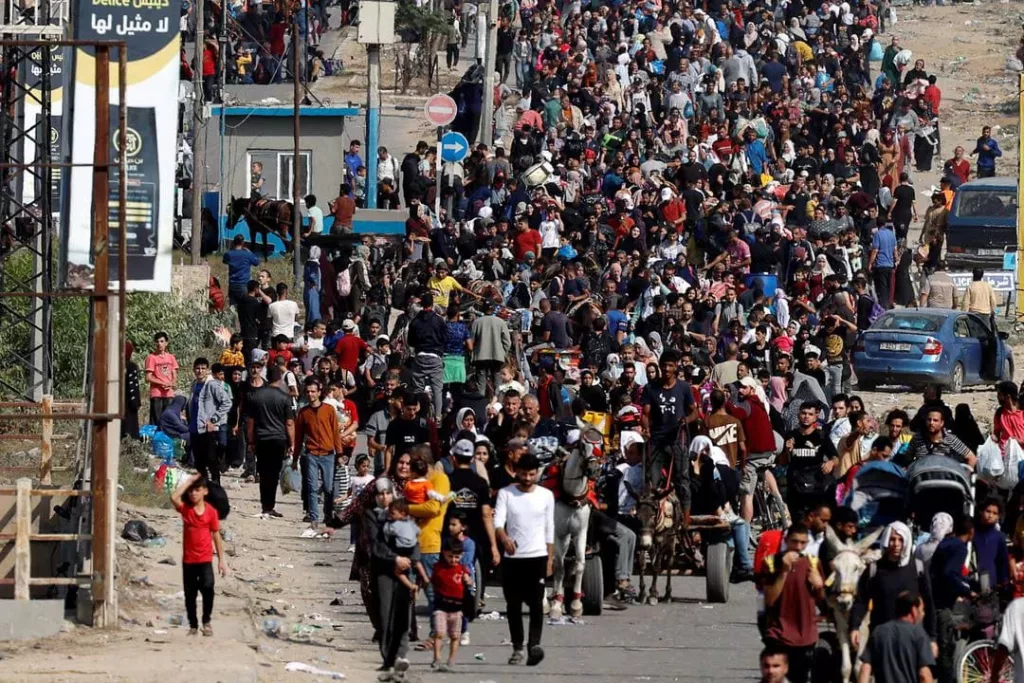

On December 1, the Israeli army produced an internet map of the Gaza Strip, breaking the area into over 600 numbered units. It instructed Gaza’s population to identify the block corresponding to their area of residence and evacuate as soon as possible. However, the leaflets handed out ordering evacuations are contradictory with online warnings, which has caused residents to become confused.
As of December 28, at least 77 journalists, predominantly Palestinians, had been killed since the beginning of the Israel-Gaza conflict on October 7. According to the Committee to Protect Journalists (CPJ) and the International Federation of Journalists (IFJ), 70 Palestinian journalists, three Lebanese, and four Israeli journalists have been killed. Among the journalists reporting on the struggle being faced by Palestinians via their own survival are Motaz Azaiza, Plestia Alaqad, and Hind Khoudary.
The Boycott, Divestment and Sanctions (BDS) Movement
Throughout its 75-year history, Israel has refined the art of colonialism and established what could be termed the best colonial business practices. The Israeli colonial project possesses many colonial traits, such as supremacy, exploitation, and entitlement, but it also has one distinguishing feature: its global corporate foundation. By combining globalisation and the free market economy into its colonial venture, Israel has built an economic incentive structure that perpetuates the territorial dispute to increase profit.
Of course, Israel is not alone in its expansionist goals. There are several examples in history of exploitative colonial regimes and the means, methods, and justifications they employed to continue their colonial policies. In the vast majority of cases, these regimes have demonstrated little self-control, necessitating the intervention of an external force (usually the desire for freedom of oppressed colonial subjects) to oppose and subjugate their ambitions.
Boycotting businesses and organisations that are associated with oppression allows consumers to demonstrate solidarity through the power of their purchases and individual accountability. According to the Palestinian BDS National Committee, the movement’s principles are to end occupation and colonisation, recognise the fundamental rights of Arab-Palestinian citizens of Israel to complete equality, and recognise Palestinians’ right to return to their homes.
Boycotts have historically been a powerful instrument for advocacy and solidarity, regardless of the persistent systems of injustice that the BDS movement works against. It is the most accessible weapon for worldwide action, allowing citizens to exert pressure on corporations and governments. It enables individuals to promote public awareness and put their money where their mouth is. Mass boycotts demonstrate the power of popular opinion to effect political change.
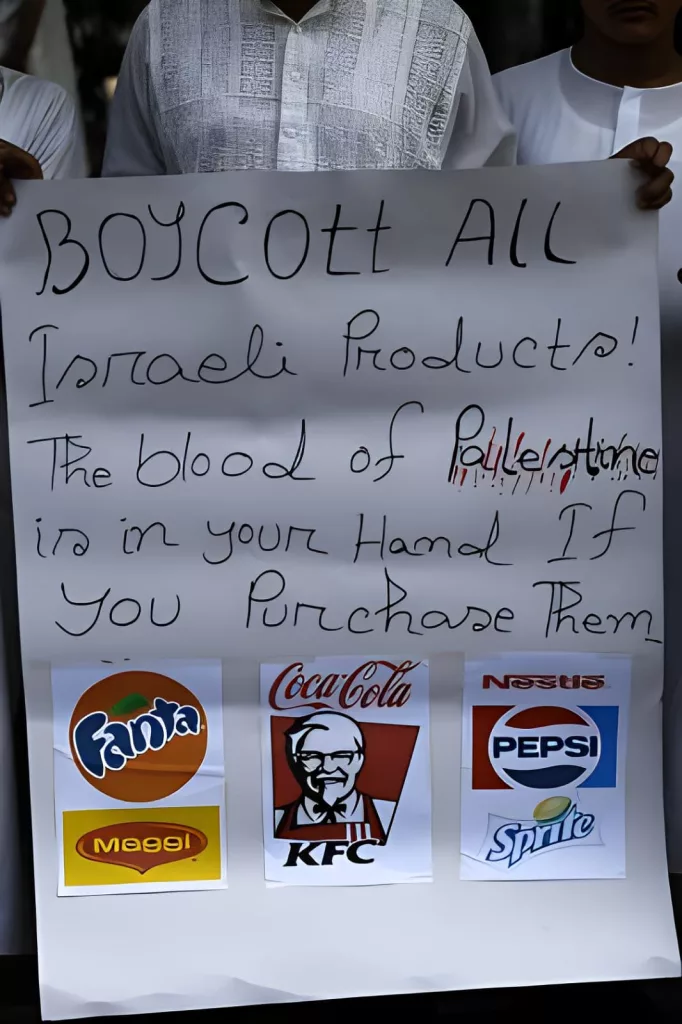

Several individuals have resorted to utilizing search engines to identify products associated with the apartheid state. However, it is acknowledged that succumbing to the allure of brands and their enticing offers is a common temptation in this context.
If, at some point in your life, you became aware of the Zionist settler colonial nature and were horrified by its practices against the indigenous people of Palestine, you will not waver. The poisonous propaganda represents Palestinians as animals, or “human animals,” marking a profound failure of humanity. This moral compass compels us to support the Palestinian people in any manner we can, while also admiring the bravery of Palestinian warriors who took over a dozen military bases, defeating the Middle East’s strongest army.
Let Us Educate Ourselves
The Palestinian people of colonised Palestine have showed the world, not for the first time and not for the last, their strong and awe-inspiring courage in the face of terror in the last few days. Of course, not knowing enough about a certain topic, issue, or concern is natural. There’s nothing wrong with wanting to learn more before making a statement or taking a stand. When you are uncertain, it is beneficial to ask questions and search for answers.
For many, the effort to address and confront colonialism begins at home. As we stand on the cusp of 2024, the writer of this piece holds a hopeful expectation for the people in her life, those she grew up with, to embark on a journey of willing growth and education. It is a call to confront uncomfortable truths, question ingrained narratives, and engage in meaningful conversations that lead to a deeper understanding of the complexity of colonialism. It is not always easy to follow your moral compass, but if it points north – towards decolonization and emancipation – it will almost certainly guide you through the mist of dishonest policies and inhumanity. From the river to the sea, may Palestine – and us – be free.
“How, then, does one become an activist?
Noam Chomsky, On Palestine
The easy answer would be to say that we do not become activists; we simply forget that we are. We are all born with compassion, generosity, and love for others inside us. We are all moved by injustice and discrimination. We are all, inside, concerned human beings. We all want to give more than to receive. We all want to live in a world where solidarity and companionship are more important values than individualism and selfishness. We all want to share beautiful things; experience joy, laughter, love; and experiment, together.”
Learn more and stay up-to-date: @eye.on.palestine, @letstalkpalestine, @theimeu, @motaz_azaiza, @byplestia, @wizard_bisan1, @hindkhoudary.














